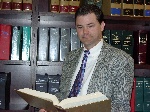Eastpointe RICO Act Lawyer, Michigan
Sponsored Law Firm
-
 x
x

Click For More Info:
-
Law Office of Mark S. Guralnick
55 Madison Avenue 4th Floor Morristown, NJ 07960» view mapCriminal Defense Law Dedicated. Fearless. Successful.
Mark S. Guralnick and his legal team have helped clients throughout the USA and across the world by applying unparalleled dedication and hard work to each case.
800-399-8371
Not enough matches for Eastpointe RICO Act lawyer.
Below are all Eastpointe Criminal lawyers.
Nathan A. Dodson
✓ VERIFIEDWe have over 20 years of combined legal experience, handling criminal law and defense cases, family law matters, including divorce and child custody c... (more)
Jeffery D Maynard
The attorneys of Maynard Law Associates, PLLC are skilled at walking our clients through each step of the complicated legal process. If you are co... (more)
 Mark Guralnick Morristown, NJ
Mark Guralnick Morristown, NJ AboutLaw Office of Mark S. Guralnick
AboutLaw Office of Mark S. Guralnick Practice AreasExpertise
Practice AreasExpertise


